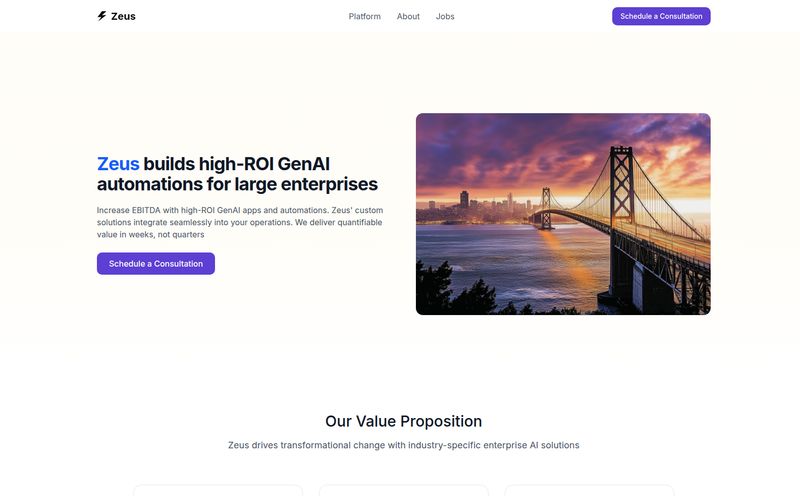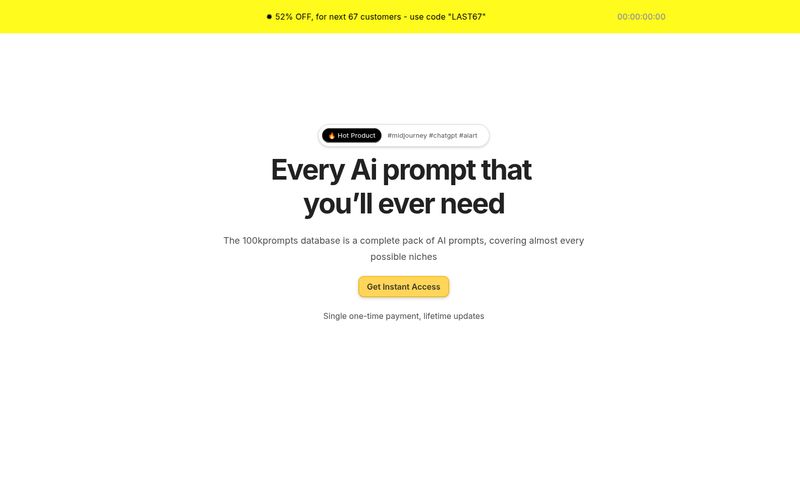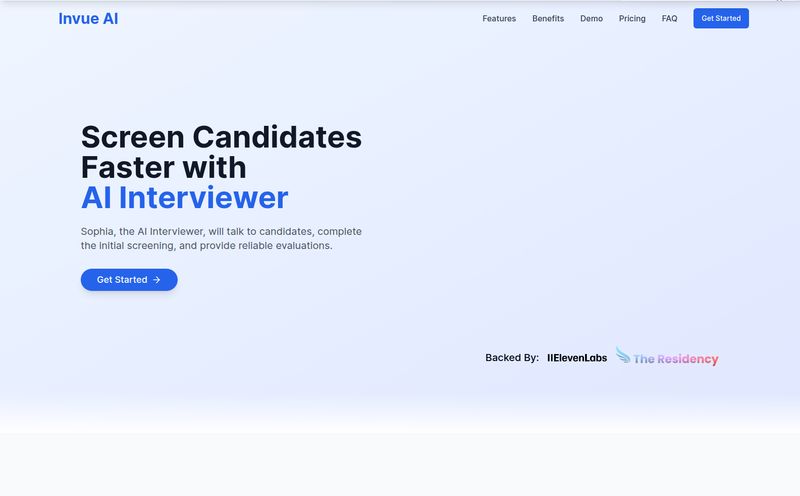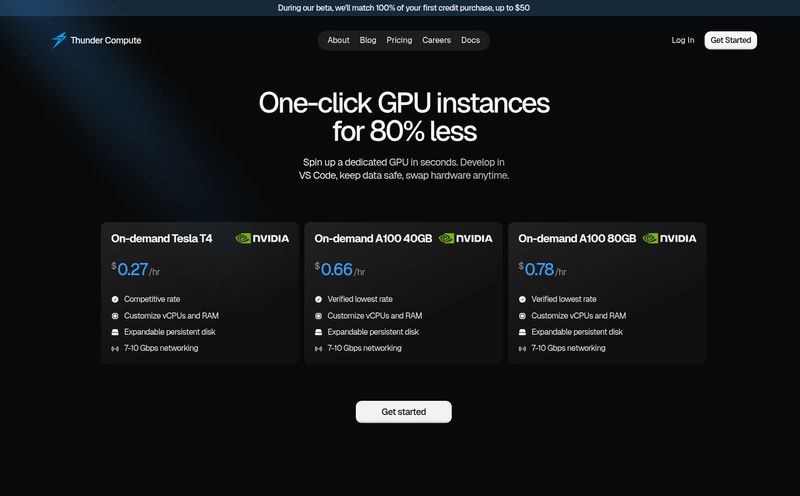The initial 'wow' factor of ChatGPT is starting to wear off in the corporate world. It's brilliant, don't get me wrong. But for serious business applications? It's a bit like hiring the smartest intern in the world who, unfortunately, has zero knowledge of your company's actual business. And the thought of feeding your sensitive, proprietary data into a massive, public model... well, it gives most CTOs the heebie-jeebies. And for good reason.
For months, we've been stuck at this weird crossroads. We see the immense power of Large Language Models (LLMs), but getting them to work safely and effectively with our own internal knowledge has been a nightmare. It’s either a massive, expensive development project or a security risk. A real catch-22.
So when a platform like AnyGen AI comes along, claiming to be the "Omni Solution for Enterprise Gen AI," my ears perk up. I’ve been in the SEO and traffic gen game long enough to know that a good chatbot can be a conversion machine. But one that's actually smart about your specific products and services? That's a whole different level. Let's dig in and see if it lives up to the hype.
What Exactly Is AnyGen AI, Anyway?
Strip away the jargon, and AnyGen AI is a platform designed to let businesses build their own secure, ChatGPT-like chatbots using their own data. Think about that for a second. Instead of a bot that knows about the history of the Roman Empire, you get a bot that knows the complete history of your product revisions, your specific support documentation, and your internal sales battle cards.
It’s less like renting a generic smart assistant and more like giving a brand-new, hyper-intelligent employee a key to your company's private library and telling them to get to work. They can then answer questions for your staff or your customers with actual, factual knowledge from your documents. This is the promise of putting your data to work, and it's something many companies have been struggling to do.
The platform bills itself as a "full Generative AI App Lifecycle platform," which is a mouthful, but it just means it aims to handle everything from building the app, to managing it, to keeping it secure, all in one place.
The Big Problem AnyGen AI Tries to Solve
The first image I saw for AnyGen AI showed this diagram of a "GPT Crossroads," and man, did that hit home. On one side, you have the raw power of models like GPT. On the other, you have the Chief Data Scientist or the IT Director staring at a bunch of roadblocks: security, privacy, complexity, which LLM to use, how to even start?
I've seen so many promising internal AI projects stall right there. Someone gets excited, they do a proof-of-concept with a public API, and then legal or security steps in and shuts it all down. AnyGen AI is positioning itself as the bridge over that chasm. It's for the enterprise that wants to use AI, not spend a year and a half building the infrastructure for AI.
A Look Under the Hood: The Key Features
So how does it actually work? It seems to boil down to a few core ideas that are pretty compelling.
No-Code and Low-Code for the Win
This is probably the biggest draw for a lot of teams. The promise of building a functional chatbot in minutes without needing a team of Python developers is huge. It democratizes the tech. Your marketing team could potentially spin up a new bot for a product launch, or your HR department could create an internal bot to answer questions about benefits enrollment. This lowers the barrier to entry from a mountain to a speed bump.
The Unified LLM Studio
I thought this was pretty smart. The AnyGen LLM Studio, as they call it, isn’t just about one model. It provides an abstraction layer, meaning you’re not permanently hitched to one LLM provider. If a new, better, or cheaper model comes out tomorrow from Google, Anthropic, or somewhere else, the architecture is designed to let you swap it in. This is a subtle but critical feature for future-proofing your investment. You get to choose the right tool for the job without re-building everything. It’s like having a universal socket wrench for AI models.
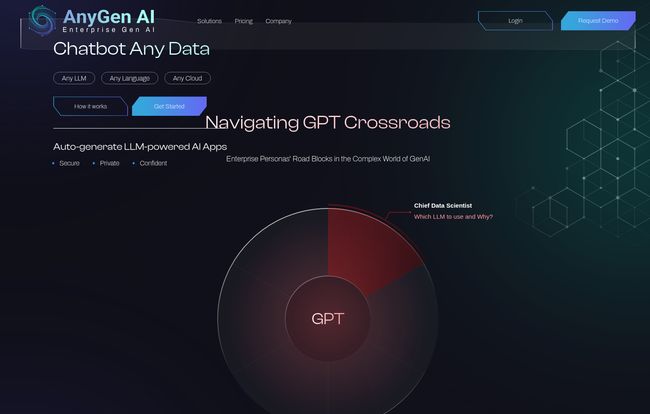
Visit AnyGen AI
Security First (Or At Least, It Should Be)
AnyGen AI is clearly leaning hard into the "secure, private, and confident" angle. And they should. This is the main differentiator between a tool like this and just piping your data into a public API. By allowing enterprises to use their own cloud environments and keeping the data processing self-contained, it addresses the single biggest fear holding back adoption. This means your customer lists, financial reports, and secret product roadmaps stay your customer lists, financial reports, and secret product roadmaps.
Let's Talk Money: AnyGen AI Pricing
Okay, this is interesting. I'd seen some older info suggesting their pricing was a bit of a mystery, requiring a custom quote. But it looks like they’ve since rolled out a clear, tiered pricing structure. I love transparency, so props to them for this.
| Plan | Price | Key Features | My Take |
|---|---|---|---|
| Free | $0 /mo /person | 1k messages, 10 documents, 10 chatbots, 1GB storage. | Incredibly generous for a free tier. Perfect for testing, small personal projects, or a proof-of-concept. |
| Starter | $99 /mo /person | 50k messages, unlimited docs/chatbots, 10GB storage, business hours support. | A solid entry point for small teams or the first real deployment in a larger company. |
| Business | $999 /mo /person | 100k messages, unlimited docs/chatbots, 100GB storage, 24/7 support. | This is a serious jump. It's clearly aimed at mid-to-large businesses with significant customer-facing or internal traffic. |
| Enterprise | Custom | Expert advisory, dedicated support, unlimited everything (presumably). | The classic "if you have to ask, you can't afford it" plan. For the big players with specific compliance and support needs. |
The per-person pricing model is always something to watch. For a small team, $99/person is manageable. But for a large customer service department, that $999/person Business plan could escalate quickly. You'd have to do the math on whether the value it provides outweighs that cost.
My Honest Take: The Good and The Not-So-Good
No tool is perfect, right? After looking through everything, here's my breakdown.
On the one hand, the ability to securely leverage your own data is the holy grail of enterprise AI right now. I can't overstate how big of a deal that is. The no-code interface and LLM flexibility are massive pluses, making the platform accessible and adaptable. It solves a real, painful problem for businesses that feel left behind by the AI boom.
However, let's be realistic. While it's "no-code" to get started, the fine print usually reveals itself in the details. The con about needing "technical expertise for advanced customization" is likely true. Want to integrate with a legacy internal database via a weird API? You’ll probably need a developer. That’s the classic low-code tradeoff. It gets you 90% of the way there in 10% of the time, but that last 10% can be a doozy.
My other question would be its capability beyond chatbots. It seems hyper-focused on that use case, which it probably does very well. But if you're looking for a platform for more specialized AI tasks—like predictive analytics or image analysis—this might not be the droid you’re looking for.
Who Is This Actually For?
I see a few clear winners here:
- The Overwhelmed IT Department: They're drowning in data and requests for AI tools. AnyGen AI offers a secure, sandboxed way to give business units what they want without compromising the entire infrastructure.
- The Agile Marketing Team: They want to build a truly helpful website assistant that can answer deep product questions, not just point to the FAQ page. They could build and manage this themselves.
- The Scrappy Startup: They want to compete with the big guys by offering a slick AI feature, but they dont have a dedicated Machine Learning team. The Starter plan could be their ticket in.
Who is it not for? Probably the hardcore data science team that wants to build custom neural network architectures from the ground up. This is an application platform, not a research workbench.
So, Is AnyGen AI the Answer to Your AI Prayers?
Look, "omni solution" is a bold claim. Is it the answer to all enterprise AI problems? No, of course not. But it does seem to be a very strong, well-thought-out answer to a very common one: making LLMs safely usable with your own proprietary information.
It’s a powerful bridge between the raw potential of generative AI and the practical, security-conscious reality of the modern enterprise. Tools like AnyGen AI are shifting the conversation. It's no longer about if companies will adopt this kind of technology, but how. And for many, this platform offers a pretty compelling and accessible 'how'. It’s definitely one to watch.
Your AnyGen AI Questions, Answered
Can I use AnyGen AI with my own cloud provider like AWS or Azure?
- The platform emphasizes flexibility and a focus on enterprise environments, which strongly implies you can host it within your own cloud infrastructure, especially on the Enterprise plan. This is a key part of its security promise.
Is the Free plan good enough to actually build something useful?
- Absolutely. With support for 10 chatbots and 1,000 messages a month, the Free plan is more than enough to build a proof-of-concept, test its capabilities with a real set of documents, and see if it fits your workflow before committing any money.
How difficult is it to connect my data sources?
- For standard formats like uploading PDFs, Word documents, or pointing it to a website, the process is likely very simple and part of the no-code experience. Connecting to more complex sources like internal databases or CRMs might require some technical help, which falls under that "advanced customization" umbrella.
What's the real difference between AnyGen AI and just using the ChatGPT API?
- Security and simplicity. With a raw API, you are responsible for building the entire application, managing data pipelines, and figuring out the security. AnyGen AI provides all that as a pre-built, secure platform. You're not sending your private data to a third-party model; you're bringing the model's intelligence to your private data.
Can I switch LLMs after I've built my chatbot?
- Yes, this appears to be a core feature. The "Unified LLM Studio" is designed to prevent vendor lock-in, allowing you to choose and potentially switch between different large language models as they become available or as your needs change.
Is the per-person pricing applied to my internal users or the end-users of the chatbot?
- Typically, this kind of SaaS pricing applies to the users who are building, managing, or administering the platform within your company (e.g., your developers, marketers, or support leads), not every single person who interacts with the finished chatbot on your website. However, you'd want to confirm this with their sales team for the Business and Enterprise plans.
